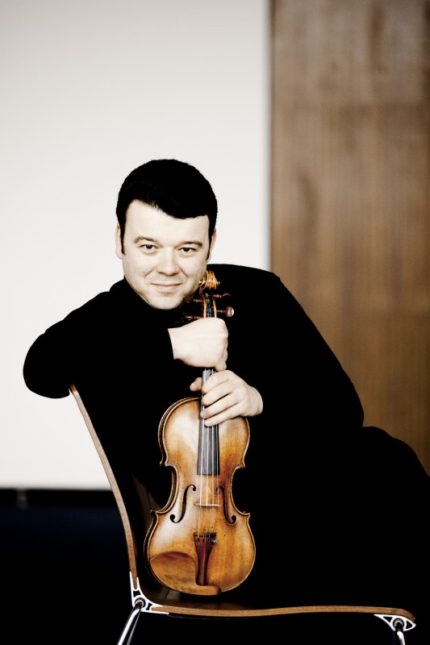Italian-Russian connections strike sparks at North Shore Chamber Music Festival

Throughout the pandemic disruptions to local ensembles over the last two years, the North Shore Chamber Music Festival led the return to live performances The series offered scaled-back performances for limited live audiences throughout 2020-21, and marked their tenth anniversary last summer—one year belated but no less significant. Returning to the Village Presbyterian Church in Northbrook to enjoy their eleventh season, it felt like one had never really lost touch.
Hats off and immense gratitude are due to violinist/artistic director Vadim Gluzman and pianist/executive director Angela Yoffe for doggedly presenting live music amid fluctuating pandemic restrictions, particularly when many other ensembles opted for completely zeroed-out schedules.
Friday night the NSCMF presented the central concert of its traditional three-performance June stand at the Village Presbyterian Church in Northbrook. Entitled “Tchaikovsky and Friends,” the program intelligently explored the cross-pollination among Russian and Italian composers, an unexpected and fruitful connection to highlight.
The evening opened with Mikhail Glinka’s Trio Pathétique in D Minor, with clarinetist Ilya Shterenberg, cellist Ani Aznavoorian, and pianist Adam Neiman. Glinka wrote the score in 1832, during a stay in Milan following a romantic disappointment, hence the “Pathétique” designation of the generally optimistic work (as Shterenberg explained in some opening remarks). Generally acknowledged as the founder of national Russian music, Glinka had a significant influence on the generation of Russian composers that followed him—Borodin, Mussorgsky, Rimsky-Korsakov, Tchaikovsky, etc.
Glinka’s own output though can sound thin compared to the immense creativity he inspired, and such is the case with the Trio Pathétique. Three faster movements give the impression of stormier but less sophisticated Haydn, though these received sensitive treatment from the three players Friday night, and benefited particularly from Neiman’s exceptionally articulate technique. The work’s centerpiece is its glowing operatic Largo. Here Shterenberg and Aznavoorian crafted what felt like an intimate scene, their soaring lines singing with melancholy. Neiman’s warm, pulsing accompaniment was a perfect support for his colleagues’ flights.
Respighi’s String Quartet No. 3 in D Major followed, in a superlative rendition by the Escher String Quartet. Respighi’s chamber music receives less air-time than it deserves, as his smaller-scale works are a welcome contrast to the bombast of the better-known tone poems of the “Roman Trilogy.” The orchestral color of these is due in no small measure to the composer’s studies with Rimsky-Korsakov—another Italian-Russian connection—but Respighi makes as much of an impression with four string players as with orchestral forces.
The Escher’s performance was faultless. The opening Allegro moderato is an inviting, almost pastoral movement, and the Escher’s four gentlemen captured its unhurried, reflective spirit. The ensuing Tema con variazioni is more tense and harmonically troubled, and the Quartet organically followed the score’s nervy ebbs and flows.
An Intermezzo follows, though it was not listed in the program, which may have caused some confusion for audience members. Here the Escher’s flexibility and fluidity were on full display, their collective sonic sheen giving life to Respighi’s limpid writing. The work closes with a galloping tarantella and a coda that recaps themes from the previous three movements. The Escher dispatched this with aplomb, earning appreciative and well-deserved applause.
The evening closed with Tchaikovsky’s Souvenir de Florence, an obvious Russian-Italian mélange. Gluzman himself was in the first violin chair with his 1690 “ex-Leopold Auer” Stradivarius, the same instrument used in the 1892 premiere of Tchaikovsky’s sextet. He was joined by second violinist Julian Rhee, one of the NSCMF’s Arkady Fomin Scholarship recipients; cellists Aznavoorian and Brook Speltz, the latter of the Escher; and violists Pierre Lapointe, also from Escher, and Masumi Per Rostad, formerly of the Pacifica Quartet and now at Eastman.
The performance was barnstorming, brimming with energy from the first measure to the double bar. Gluzman was in his element leading this music, playing with assertive flair and panache throughout. He and Aznavoorian sang a beautiful cantilena in the Adagio cantabile et con moto, and the six players masterfully captured the fey aspects of the ensuing Allegro moderato. The concluding, almost demonic Allegro vivace went with enormous force, all six players collectively digging into their instruments and leading to a climax of visceral impact.
The North Shore Chamber Music Festival concludes 7:30 p.m. Saturday with “Carnival”, a program featuring Saint-Saëns’ Carnival of the Animals, along with works of LeClair, del Aguila, Vartabed, Turina, Barber, Chopin and Sarasate. nscmf.org
Posted in Performances





Posted Jun 11, 2022 at 1:07 pm by Irina Miller
Bravo!
Music must live on!